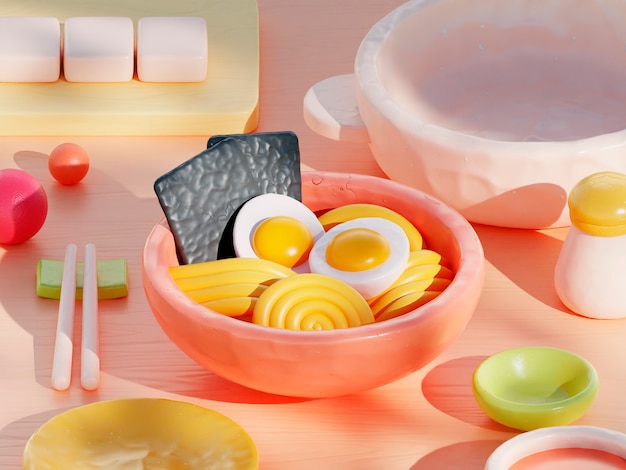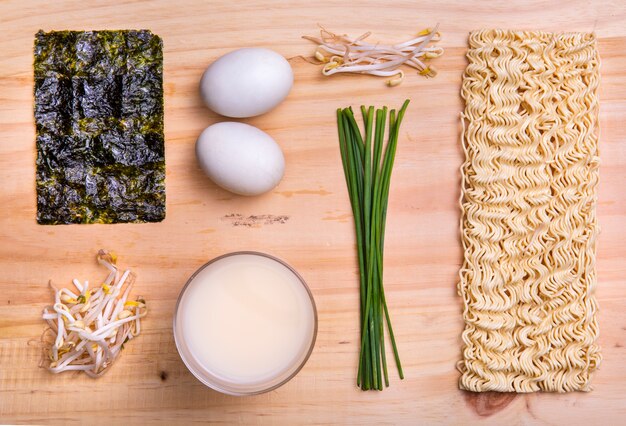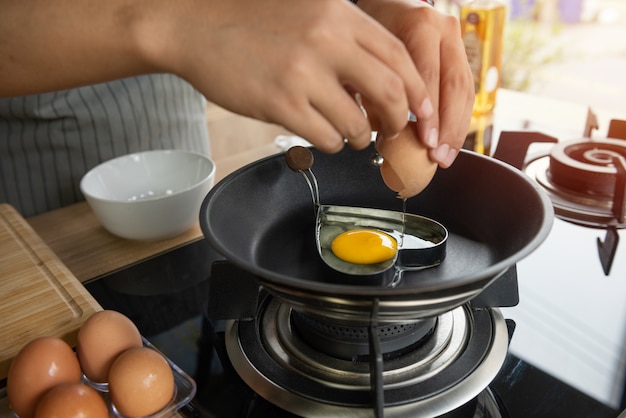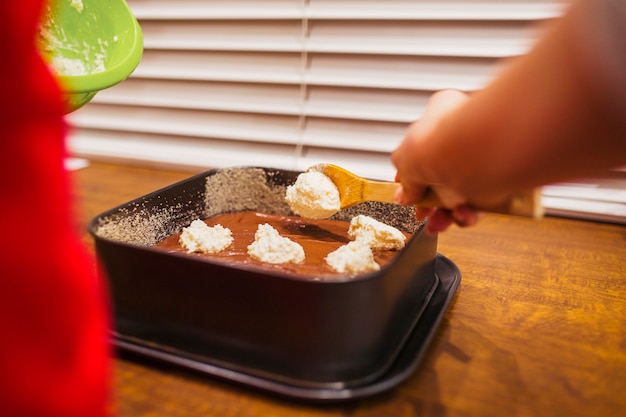Ramen. Just the word conjures up images of steaming bowls, rich broth, and perfectly cooked noodles. But there's one element that elevates this humble dish to a whole new level: the egg. That silky, runny yolk, that smooth, firm white, and the subtle flavour it brings – it's the perfect counterpoint to the ramen's umami richness. So, get ready to unlock the secrets of the perfect ramen egg, from choosing the right egg to mastering the art of presentation.
(Part 1) The Foundation: Choosing the Right Egg

You can't just grab any old egg from the fridge and expect it to transform into a ramen masterpiece. The journey to a perfect egg starts with choosing the right one.
The Egg of Choice: Free-Range, Medium-Sized
Let's be honest, free-range eggs are the way to go. They have a deeper flavour, a richer yolk, and you know the hens have a better life. That's a win-win in my book. And for ramen, medium-sized eggs are the perfect choice. They're versatile enough to cook evenly and create that beautiful contrast between the yolk and white.
Beyond the Basics: The Impact of Egg Type
Now, you might be wondering, do other types of eggs matter? Absolutely. The type of egg you choose can subtly change the flavour and texture of your final product.
- Brown vs. White: Honestly, the colour of the shell doesn't really affect the flavour or texture. It's all about the hen's diet and breed.
- Pasture-Raised: If you can get your hands on pasture-raised eggs, you'll be rewarded with an even richer flavour and a more vibrant yolk. It's a slight difference, but it's noticeable.
- Duck Eggs: These have a slightly richer yolk and a more robust flavour, but they're a bit harder to find. If you come across them, give them a try!
(Part 2) The Art of Preparation: Getting Your Egg Ready

So, you've chosen the perfect egg. Now, it's time to prepare it for its starring role in your ramen masterpiece.
The Soak: Infusing Flavour
This is a little trick I learned from a Japanese chef: soak your eggs in a flavour-infusing marinade. This elevates the egg's flavour profile and adds a subtle complexity that complements the ramen perfectly.
Here's what you'll need for the marinade:
- 1 cup water
- 1/4 cup soy sauce
- 1/4 cup mirin (sweet rice wine)
- 1 tablespoon sake (japanese rice wine)
Combine the ingredients in a bowl and gently place your eggs in the marinade. Let them soak for at least 2 hours, or up to overnight for maximum flavour infusion.
The Peel: A Gentle Touch
When it comes to peeling your eggs, be gentle, my friend. You don't want to end up with a raggedy egg that looks like it's been through a war. A gentle tap on the bottom of the egg, a small crack, and then peel slowly and carefully under running water.
(Part 3) The Big Moment: The Cooking Process

This is the crucial moment where you transform your humble egg into a ramen superstar. Let's dive into the method I've found most reliable for that perfect, runny yolk and firm white.
The Simmer: Finding the Sweet Spot
I'm a firm believer in simmering your eggs. It's the key to achieving that lovely, runny yolk and the smooth, tender white. Bring a pot of water to a gentle simmer, add your eggs carefully, and then let them simmer for 6-8 minutes.
The ice bath: Quenching the Heat
After simmering, it's time to shock your eggs. This involves plunging them into a bowl of ice water. This stops the cooking process instantly, ensuring that perfect texture. If you don't have an ice bath, running cold water over the eggs for a few minutes will do the trick.
Understanding the Science: Why Simmer and Shock?
Let's break down the science for a minute. When you cook an egg, the heat causes the proteins in the yolk and white to denature and coagulate. The longer you cook, the more those proteins solidify. Simmering allows for a gradual and even cooking process, creating that perfectly firm white. The ice bath stops the cooking process before the yolk becomes hard, ensuring that desirable runny texture.
(Part 4) The Finishing Touches: Adding Flair
Okay, your egg is cooked to perfection, but it's not quite ready for its ramen close-up. Let's add some final touches to make it truly irresistible.
The Dip: A Splash of Colour
A simple dip in a flavour-enhancing mixture can elevate your egg from good to great. It adds that beautiful marbled effect and enhances the flavour profile with subtle sweetness and umami notes.
Here's a simple marinade recipe:
- 1/4 cup soy sauce
- 1 tablespoon mirin
- 1 teaspoon sugar
- Optional: A pinch of ginger or garlic for added depth
Combine the ingredients in a bowl, gently add your eggs, and let them marinate for at least 30 minutes. The longer they marinate, the more intense the flavour will be.
The Presentation: The Finishing Touch
Remember, you eat with your eyes first. The presentation of your egg is as important as its flavour. Place it carefully in your ramen bowl, ensuring the yolk is beautifully visible. A little drizzle of the soy sauce mixture, a sprinkle of spring onions, and maybe even a touch of nori for extra visual appeal – it's all about creating a beautiful and appetizing spectacle.
(Part 5) The Ramen Experience: Enjoying Your Creation
You've gone through the whole process, the anticipation is building, and your ramen bowl is looking spectacular. Time to enjoy the fruits of your labour!
The First Bite: The Burst of Flavour
Take a big, satisfying slurp of your ramen, and then go for that egg. The first bite should be a symphony of flavours and textures. The silky smooth yolk, the firm but tender white, the umami richness of the broth – it's a truly satisfying experience.
The Ramen Journey: Discovering New Delights
Once you've conquered the perfect ramen egg, you can start exploring different variations. Try adding different sauces, like spicy gochujang or tangy yuzu. Experiment with different toppings like mushrooms, bamboo shoots, or even crispy seaweed. The possibilities are endless. Remember, ramen is all about personal preferences and creativity.
(Part 6) The Variations: Exploring the Ramen Egg Spectrum
Okay, so the classic ramen egg is a masterpiece in its own right. But let's be honest, sometimes you want to shake things up a bit. Here's a little glimpse into the world of ramen egg variations.
The ajitsuke tamago: The Ultimate Umami Bomb
This egg is like a hardcore version of the classic ramen egg. It's infused with a rich soy sauce marinade for a seriously intense umami flavour. The yolk is still runny, but the white is more firm and intensely flavoured. It's a bolder choice for those who prefer a more robust flavour experience.
The Soft Boiled: A Delicate Touch
If you prefer a gentler approach, the soft boiled egg is for you. It's a softer, more delicate version of the ramen egg, with a runny yolk and a tender white. It's a perfect option if you want to add a touch of elegance to your bowl. The subtle flavour profile is perfect for those who appreciate a more refined taste.
The marbled egg: A Work of Art
This egg is all about the visual appeal. It's created by carefully marinating the egg in a mixture of soy sauce, mirin, and sugar. The result is a beautifully marbled egg with a subtle sweetness and a lovely caramel colour. It's a great choice for those who appreciate a visually stunning presentation.
(Part 7) The Science of the Egg: Understanding the Process
Alright, you've mastered the art of the ramen egg, but do you really understand what's going on? Let's delve a bit deeper into the science behind the perfect egg.
The Egg's Anatomy: A Closer Look
An egg is basically a protein package. The yolk contains fats and proteins, while the white is mostly water and proteins. The different proteins react to heat differently, resulting in different textures.
The Chemistry of Cooking: Proteins in Action
When you cook an egg, the heat causes the proteins in the yolk and white to denature and coagulate. The longer you cook it, the more the proteins solidify. This is why a perfectly cooked ramen egg has a runny yolk and a firm white. It's all about finding that sweet spot where the proteins have just coagulated enough to create the desired texture.
(Part 8) The Beyond Ramen: Expanding Your Egg Horizons
You've perfected the ramen egg, but that doesn't mean you need to stop there. The humble egg is a versatile ingredient that can be used in countless dishes, both sweet and savoury.
The Breakfast Star: Eggs Benedict, Scrambled, and More
Eggs are breakfast royalty. Think Eggs Benedict, fluffy scrambled eggs, or even a simple poached egg on toast. It's a delicious and satisfying way to start your day.
The Salad Savior: Adding Texture and Flavor
A hard-boiled egg adds a satisfying crunch and protein boost to any salad. Slice it up, sprinkle it on top, or even use it as a decorative garnish.
The Baking Buddy: From Cakes to Souffles
Eggs are essential in baking. They provide structure, richness, and even help bind ingredients. Think of cakes, cookies, soufflés, and even bread.
(Part 9) The FAQs: Your Ramen Egg Questions Answered
I know you're itching to get started on your ramen egg adventure, but you might have a few questions. Let's tackle some common ones.
1. What happens if I overcook my egg?
If you overcook your egg, the yolk will become hard and rubbery. The white will also be tough and dry. It's not the end of the world, but it definitely won't be as satisfying as a perfectly cooked egg.
2. Can I use any kind of soy sauce for the marinade?
It's best to use a high-quality soy sauce for the marinade, as it will have a richer flavour. Try a Japanese soy sauce, like Kikkoman, for the best results. The higher quality soy sauce will have a more complex flavour profile that enhances the overall taste of your egg.
3. How long can I keep the eggs in the marinade?
You can keep the eggs in the marinade for up to 24 hours. This will allow the flavour to penetrate the egg more deeply. However, after 24 hours, the flavour can become too intense and the egg white might become too firm.
4. Can I use a different type of egg?
Yes, you can use a different type of egg, but the results may vary. Some eggs have a thicker white or a yellower yolk, which could affect the texture and flavour of your egg. Duck eggs, for example, will have a more robust flavour and a slightly firmer texture, while quail eggs will be smaller and have a more delicate flavour. It's all about experimenting and discovering what you like best.
5. What if I don't have an ice bath?
If you don't have an ice bath, you can use cold water from the tap. The important thing is to cool the eggs down as quickly as possible to stop the cooking process. This will help prevent the yolk from overcooking and becoming rubbery.
Now, armed with this knowledge and a passion for ramen, go forth and create your own ramen egg masterpiece. Enjoy the journey and the delicious results!
Everyone is watching

How to Cook Frozen Lobster Tails Perfectly: A Step-by-Step Guide
RecipesLobster. Just the word conjures up images of lavish meals, special occasions, and a taste of luxury. But let's...

Pork Fillet Cooking Time: How Long to Cook It Perfectly
RecipesPork fillet, or tenderloin as it's sometimes called, is a real favourite in our house. It's so versatile, and...

Pigs in a Blanket Cooking Time: How Long to Bake for Perfect Results
RecipesAh, pigs in a blanket. Just the name conjures up images of those delightful little parcels of crispy pastry en...

The Ultimate Guide to Cooking Delicious Frankfurters
RecipesLet's face it, we all love a good frankfurter. It's a classic, simple, and always satisfying. But let's be rea...

Wolf Meat Recipes: A Guide to Cooking Wild Game
RecipesLet's be honest, you don't see wolf meat at your local butcher shop every day. It's a bit of a wild card, but ...
